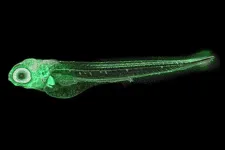(Press-News.org) An international team of scientists from Sweden, Norway, Japan, and Switzerland, has presented research findings that reveal a crucial role of biological particles, including pollen, spores, and bacteria, in the formation of ice within Arctic clouds. These findings, published today in Nature Communications, have far-reaching implications for climate science and our understanding of the rapidly changing Arctic climate.
The research, whose outcomes have unveiled the connection between biological particles and the formation of ice in Arctic clouds, was conducted over multiple years at the Zeppelin Observatory, situated on the remote Norwegian archipelago of Svalbard, Norway, in the High Arctic. Gabriel Freitas, lead author and PhD student at Stockholm University, detailed their innovative approach: "We have individually identified and counted these biological particles using a sensitive optical technique reliant on light scattering and UV-induced fluorescence. This precision is essential as we navigate through the challenge of detecting these particles in minuscule concentrations, akin to finding a needle in a haystack."
Sugar alcohols as indicators of fungal spores
The study delved into the seasonal dynamics of biological particles, establishing correlations with variables such as snow cover, temperature, and meteorological parameters. Furthermore, the presence of biological particles was confirmed through various methodologies, including electron microscopy and the detection of specific substances, such as the sugar alcohol compounds arabitol and mannitol.
Karl Espen Yttri, senior scientist at the Climate and Environmental Research Institute NILU and a co-author of the study, underscored that: "While arabitol and mannitol are present in various microorganisms, their presence in air are related to fungal spores, and might originate both from local sources or from long range atmospheric transport”.
Microbes contribute to ice nucleation at Zeppelin Observatory
The quantification of ice nucleating particles and understanding their properties proved to be a cumbersome challenge. Researchers employed two distinct methods, involving the collection of particles on filters over a week, followed by rigorous laboratory analysis.
Yutaka Tobo, Associate Professor at the National Institute of Polar Research in Japan and co-author of the study, described their strategy: "Our method can quantify the ice nucleating ability of aerosol particles immersed in water droplets at temperatures ranging from 0°C down to about -30°C, thereby revealing the concentration of ambient ice nucleating particles active in Arctic low-level clouds."
Franz Conen, Research Fellow at the University of Basel, Switzerland, added, "By subjecting the filters to additional heating at 95°C, we could identify the proteinaceous component of ice nucleating particles, shedding light on their potential biological origin. Our findings unequivocally establish the prevalence of biological particles contributing to ice nucleation at Zeppelin Observatory."
Paul Zieger, Associate Professor at Stockholm University and co-author, emphasized the important implication of these findings for climate science: "This research offers critical insights into the origin and properties of biological and ice nucleating particles in the Arctic that could enable climate model developers to improve the representation of aerosol-cloud interactions in models and reduce uncertainties related to anthropogenic radiative forcing estimates."
Increases in open ocean areas and snow-free tundra, both sources of biological particles in the Arctic, are expected in the coming decades. Therefore, gaining a deeper understanding of the relationship between these particles and clouds may provide valuable insights into the ongoing and future transformations occurring in the Arctic.
Read article in Nature Communications Regionally sourced bioaerosols drive high-temperature ice nucleating particles in the Arctic
Press contact:
Stockholm University: Stella Papadopoulou: stella.papadopoulou@aces.su.se
NILU: Christine F Solbakken CFS@nilu.no
Corresponding author: Paul Zieger paul.zieger@aces.su.se
END
Biological particles play crucial role in Arctic cloud ice formation
2023-09-28
ELSE PRESS RELEASES FROM THIS DATE:
Fitness and staving off weight gain may be more important than weight loss for preventing kidney disease in obese adults, Drexel study says
2023-09-28
Fitness and Staving Off Weight Gain May Be More Important than Weight Loss for Preventing Kidney Disease in Obese Adults, Drexel Study Says
As obesity is a contributing factor to chronic kidney disease, weight loss can help mitigate a patient’s risk. But new research suggests that fitness and preventing weight gain could actually play a more important role in reducing risk than weight loss. The findings were published today in the journal Obesity from researchers at Drexel University’s College of Medicine and Dornsife School of Public Health.
The researchers followed 1,208 overweight ...
Child Development journal Q&A: Music intervention programs can enhance parent and baby language interactions
2023-09-28
Previous research shows that conversational turns (interactive conversations) between parents and children are important for a child’s long-term language development and academic achievement and that these conversations can be enhanced via parent-coaching language interventions. The neural networks responsible for language develop rapidly even before a child can talk, making these interactive conversations especially important during infancy.
Music is an engaging and social experience between parents and children that is often part of daily routines during infancy. Emerging literature also documents links between music experiences and child language outcomes. Researchers ...
New program helps improve toddlers’ self-control skills and healthy eating habits
2023-09-28
Two of the best predictors of life-long health and well-being are early childhood self-control skills and healthy eating habits. A new program that teaches parents how to cook with their 2-year-olds is helping toddlers excel on both fronts. Doing things like stirring ingredients together without spilling and singing a song while something is in the microwave helps toddlers learn multiple important self-control skills, like paying attention, controlling their bodies, waiting patiently, and cooperating with their parents. Toddlers also get excited about being involved in the “grown-up” activity and are more likely to try the new foods they help make. Previous research has shown that ...
Cannabis use disorder may be linked to increased risk of cardiovascular disease
2023-09-28
A new study has found that Canadian adults with cannabis use disorder appear to have an approximately 60% higher risk of experiencing their first heart attack, stroke, or other major cardiovascular event than those without cannabis use disorder.
The study, published in Addiction, measured the association between problematic marijuana use and the first-time occurrence of adverse cardiovascular disease events such as heart attack, stroke, cardiac dysrhythmias, and peripheral vascular disease.
Researchers used five Canadian health databases to create a cohort of nearly 60,000 participants, half with a cannabis use disorder ...
Fish reveal cause of altered human facial development
2023-09-28
Some substances in medicines, household items and the environment are known to affect prenatal child development. In a study published in Toxicological Sciences, researchers tested the effects of five drugs (including caffeine and the blood thinner warfarin) on the growth of zebrafish embryos. They found that all five had the same effect, impairing the migration of bone-forming cells which resulted in the onset of facial malformation. Zebrafish embryos grow quickly, are transparent and develop outside of the parent’s body, ...
How safe is your sushi?
2023-09-28
Sushi has become everyday fare in Norway and elsewhere around the globe, and many people opt for sashimi and other raw fish when they want to treat themselves to something tasty.
It is important to emphasise here that, as a general rule, it is completely safe to eat this type of food in Norway. However, despite the fact that sushi can be delicious, it also carries a health hazard, both for individuals and for society at large.
“Bacteria in sushi, sashimi and cold-smoked fish products can pose a risk to people who eat such foods frequently, especially people with weak immune systems, children and the elderly,” says Hyejeong Lee.
She recently completed her PhD at the Department ...
Job loss is linked to increased risk of miscarriage and stillbirth
2023-09-28
Researchers have found a link between a pregnant woman or her partner losing their job and an increased risk of miscarriage or stillbirth.
The study, which is published today (Thursday) in Human Reproduction [1], one of the world’s leading reproductive medicine journals, found a doubling in the chances of a pregnancy miscarrying or resulting in a stillbirth following a job loss.
The researchers, led by Dr Selin Köksal from the Institute for Social and Economic Research at the University of Essex, UK, ...
Protein p53 regulates learning, memory, sociability in mice
2023-09-28
Researchers have established the protein p53 as critical for regulating sociability, repetitive behavior, and hippocampus-related learning and memory in mice, illuminating the relationship between the protein-coding gene TP53 and neurodevelopmental and psychiatric disorders like autism spectrum disorder.
“This study shows for the first time that p53 is linked directly to autism-like behavior,” said Nien-Pei Tsai, an associate professor of molecular and integrative biology at the University of Illinois Urbana-Champaign and a researcher at the Beckman Institute for Advanced Science and Technology.
In living systems, ...
New report adds heat to Levelling Up debate by revealing England's most 'insecure' regions
2023-09-28
Accessing stable employment with fair pay and predictable hours is harder for workers in the North and Midlands, which can severely affect their living standards, health, and future job prospects.
A new report published by the Work Foundation at Lancaster University reveals the regions with the highest and lowest levels of ‘severely insecure’ work (employment that is involuntarily temporary or part-time, or when multiple forms of insecurity come together, such as casual or zero-hours contracts, or low or unpredictable ...
Swapping starch and refined carbs for whole grains and fruit linked to less midlife weight gain
2023-09-28
Increased consumption of carbohydrate from refined grains, starchy vegetables, and sugary drinks is associated with greater weight gain throughout midlife, while increased fibre and carbohydrate from whole grains, fruit, and non-starchy vegetables is linked to less weight gain, finds a large US study published by The BMJ today.
Most of these associations were stronger for people with excessive body weight, highlighting the potential importance of carbohydrate quality and source for long term weight management, say the researchers.
The role of carbohydrates in weight gain and obesity remains controversial, and few studies have evaluated ...






